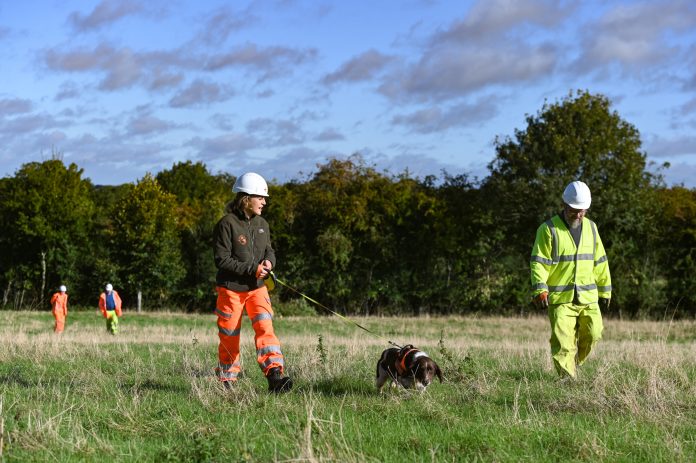A water company enlisted the help of specially trained sniffer dogs to detect protected rare newts during pipe installation work.
It is the first time that South East Water has successfully trialled canine experts to sniff out traces of great crested newts.
More traditional methods of newt detection involve labour-intensive techniques and require the use of plastic materials.
With the help of Arnie and Rocky, from Wagtail UK, and Atkins Global, South East Water was able to completely eradicate the use of plastic and scour a large area – approximately 10,000 square metres – in just two days.
The company is currently installing nearly 12 kilometres of water pipe between Fleet and Odiham, Hampshire.
Emma Goddard, South East Water Head of Environmental, said: “The traditional method would involve installing approximately two kilometres of fencing which would be visible for months – becoming a significant eyesore to the Conservation Area and for residents in the process.
“It also creates a barrier to other animals’ natural movement across the working area.
“This was an excellent example of using innovation to improve the way we work and to save tens of thousands of pounds. We’ll also be lowering our carbon footprint across the project by reducing the number of times we need to visit site to set up and look for newts from more than 40 to approximately seven.”
The first trial took place in October and the dogs will be used throughout the remainder of the project at key intervals, under licence from Natural England.
Luke Gorman, from Atkins Global, said: “We have been using detection dogs on a number of projects, as it has shown to be a highly efficient, cost-effective and sustainable method of detecting great crested newts on development sites.
Although no newts were found, the dogs did detect their scent in locations they had been known to frequent previously. Any newts discovered will be moved to a more suitable location by ecologists from Atkins Global.
Arnie and Rocky are trained not to chase the newts; they sit patiently or lie down to alert their handler they have picked up a scent.
Matthew Cooper, South East Water Project Manager, added: “Using dogs is a far more efficient method than the more traditional option of sinking plastic buckets into the ground to capture the newts. It is also a far less invasive alternative.
“We were able to cover a vast amount of land in just two days and thankfully no newts were detected, meaning we can continue to lay pipe in the area without disturbing them.”



